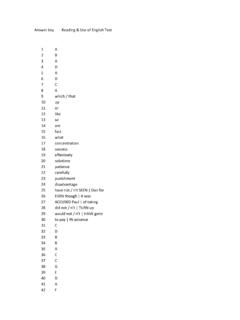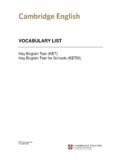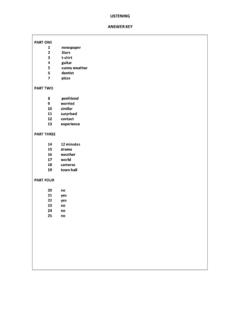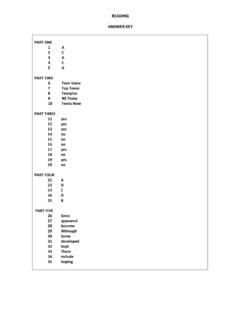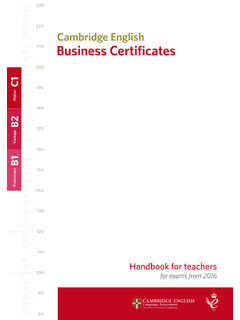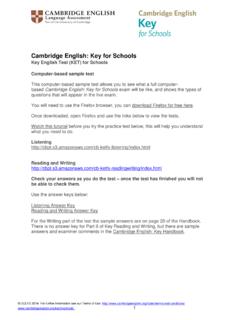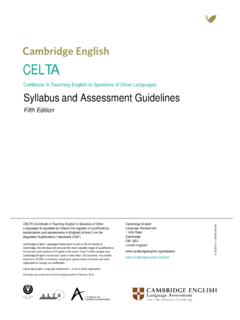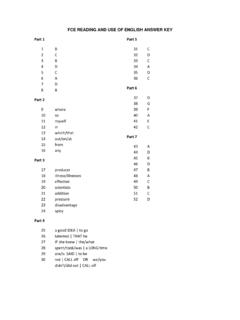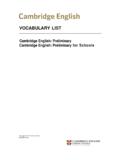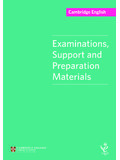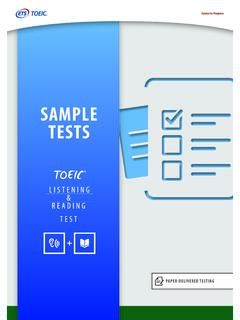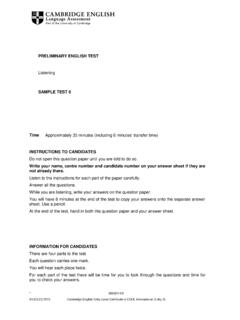Transcription of B2 First for Schools Listening Part 1 (Multiple choice ...
1 1 B2 First for Schools Listening part 1 ( multiple choice ) Summary Review the format of part 1 of the Listening paper. Learn some useful vocabulary for giving an opinion. Practise two different Listening test strategies. Do a real timed practice of the Listening paper ( part 1 only). Before you begin Locate the audio you need for the lesson Click here to download a folder of audio files (MP3 format). You will only need Track 2 for this lesson. Top tip! Listen to real audio and video as much as possible. It takes time to develop Listening skills, so it s a good idea to listen to things in English whenever you can.
2 The best things are those which you really find interesting. You could watch a film (perhaps with the subtitles but only if they re also in English!), download podcasts about your favourite topics, or find English-speaking people on YouTube who share interesting ideas. Get to know the exam This lesson focuses on part 1 of the Listening paper. This is made up of 8 questions and tests your ability to understand feelings, attitudes, opinions and agreement or disagreement expressed by different speakers, as well as the purpose or function of an audio clip. Task A.
3 What else do you know about this paper? Read the following statements about Listening part 1 and decide if they are true or If they are false, correct them. Answers are at the end of this document. 1. You may hear one or two speakers. 2. You will hear seven different clips. 3. For each question, there are three options for you to choose from (A, B or C). 4. Some of the questions focus on the opinions or feelings of the speaker(s). 5. The options for each question are always presented in the same order as you hear related information. 6. You will hear exactly the same words as you read in the options.
4 7. You will receive one mark for each correct answer 8. Sometimes you may have to decide whether two speakers agree with each other. Task B. Now do some research online and check your ideas. You might find the Cambridge English website a helpful place to start. 1 This activity comes from Exam Booster with answer key for First and First For Schools , Self-study edition, Cambridge University Press and UCLES 2017, p. 118. 2 Useful language: Giving an opinion We saw above that some of the questions in Listening part 1 focus on the opinions or the feelings of the speaker (or speakers).
5 It s easier to hear these moments in the recording and answer the questions correctly if you know the kind of language that speakers often use to express their opinions or feelings. 1. Read the dialogues below. Which one is: a. a formal discussion on the news? b. a conversation between a brother and sister? How do you know? Highlight the parts of the dialogues that helped you to decide. Dialogue 1: _____ A: My mate just gave me this amazing new video game for my birthday! B: A video game? Isn t that just for little kids? A: It s aimed at teenagers, actually.
6 You have to create a whole world on a different planet, with its own language, culture, society and everything. Brilliant, isn t it? B: Yeah, if you like aliens, I suppose. A: Well, I do. But clearly it s not your thing. You might prefer this other game I have it s a kind of competitive dancing thing. But I m not really into dancing, so I don t play it. Do you want it? B: Oh wow, that s fantastic! Thanks! Dialogue 2: _____ A: This year s event really was excellent. Thousands of people from all over the country took part and we raised a lot of money for charity.
7 B: Of course, some of the people who tried to call and donate money weren t able to get through. That isn t to say it wasn t well organised it most certainly was! Though perhaps next year there could be more staff to answer the phones. A: Alright, but in general, I think you ll agree it was a great success. We had far more participants than last year and we included a wider range of activities, including games like chess and cards. B: I personally would have liked to see more physical activities like gymnastics or yoga, rather than things which keep everybody sitting down for hours!
8 2. Now match these expressions from the dialogues above to their meanings, below. When the speaker says this: he / she means this: 1. amazing, brilliant, fantastic a. I know that you don t like this, but I have a suggestion which I think you will like more. 2. It actually. b. I feel strongly about this and I really want you to agree with me. (But it s possible that you disagree.) 3. If you I suppose. c. I have a different opinion to you, and I think your opinion is a bit strange! Who likes aliens?! 4. It s not your thing. You might d. I really like this.
9 5. That isn t to say it wasn it most certainly was! e. In my opinion, this wasn t good and I have a better idea about how to do it. 6. I think you ll f. You don t understand let me correct you. 7. I personally would have , rather g. I think something about this was good, but the rest of my opinion is generally more negative. 3 Tip! The vocabulary you learn for one paper could be useful for other papers, too. By studying language for one paper, you re also helping improve your knowledge for the other papers! For example, you could use the expressions you learned above in your Speaking test.
10 It s a good idea to keep a vocabulary notebook so you can record the words and phrases you re learning and begin to use them in your own speech or writing. Test strategies: Find what works for you A lot of students find Listening difficult. It takes time to improve your Listening skills, and there are different ways of doing the exam tasks which work well for some people and not for others. Let s try two different strategies Test strategy 1: Find, focus, favourite! Every clip in the Listening paper is played twice. This strategy uses the First time to listen and the second time to choose the best answer (A, B or C).
